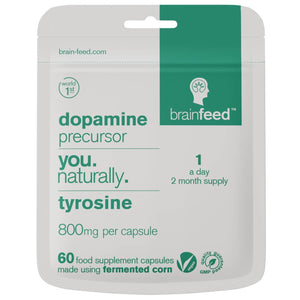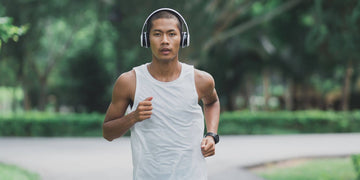Dopamine and social media: The science behind scrolling for hours.
filter
Key points
- Dopamine drives social media's reward cycle
- Excessive use can reinforce social media addiction through reward anticipation
- Time limits, offline routine, and tyrosine restore dopamine balance
Completing a major project that you worked hard on, crossing the finishing line in a marathon, and an intense gym session feel great when completed. The rewarding feeling you achieve at the end is also what keeps you going, despite the journey. Your brain has perfected a motivation and reward system that influences most daily activities. It was designed to help humans overcome challenges. In the modern world, there are many things that feel rewarding more easily. Social media is one of them. Every “like”, message notification, praising comment, fills you with pleasure in a matter of seconds. How does your brain manage this constant influx of pleasure? What happens when it gets too much too soon? An estimated 43% of people in the UK report spending too much time on social media [3 Trusted Source Review42 3rd-party source 35 Eye-Opening UK Social Media Statistics [2024 Info] ] and at least 6% of the global population suffer from a social media addiction, garnering need for attention [6 Trusted Source 2014 - Cyberpsychology, Behavior, and Social Networking Systematic and meta-analysis Internet Addiction Prevalence and Quality of (Real) Life: A Meta-Analysis of 31 Nations Across Seven World Regions ] . This Men’s Health Week, let’s explore the relation between social media and mental health and ways to protect yourself.
The science of reward and pleasure: Dopamine’s role.
Your reward and pleasure brain chemical is dopamine. It also plays a primary role in motivating you to perform important activities, so maintaining a healthy balance is essential. It is released when your brain is anticipating a pleasurable action. Once the action is complete, dopamine motivates you to do it again. When you spend hours preparing for a meeting, which goes well and earns you the praises of your boss, it is dopamine that motivates you through the arduous preparation to experience the rewarding feeling in the end. Dopamine also plays a part in seeking new experiences [1 Trusted Source 2014 - Behavioral Neuroscience 3rd-party resource Dopamine modulates novelty seeking behavior during decision making ] . Exploring a new city can lead to discovering places you might love. Dopamine keeps you going because it loves the possibility of reward. Without dopamine, life would be very dull. One way to increase dopamine levels healthily is through its building block, L-tyrosine. L-tyrosine is found in tofu, cheese, beef, and other protein rich foods. Apart from food sources, the world’s 1st natural 800mg tyrosine capsule made from fermented corn is an easy way to naturally increase dopamine production.
Effects of social media on the brain: What is happening?
When you post a picture on social media and get multiple likes and comments, your dopamine is fired up with each like and comment, motivating you to continue posting pictures for a constant stream of rewarding feeling. Dopamine’s love for novelty also keeps you scrolling on social media, where you find something amusing, spiking up short-lived pleasurable feelings. It can be compared to a mild form of thrill-seeking. Brain scans of thrill-seekers showed capacity for constantly high dopamine levels [2 Trusted Source 2008 - Journal of Neuroscience 3rd-party resource Midbrain Dopamine Receptor Availability Is Inversely Associated with Novelty-Seeking Traits in Humans ] . For most people, having an online presence is a healthy part of their lifestyle, even necessary in some cases. The issue arises when social media consumes most of your day, and you live your life “online” more than “offline”.
Constantly seeking pleasurable emotions through social media posting/scrolling puts the dopamine system into overdrive. Over time, the pleasure and reward system become disrupted. This is due to the constant feedback system of anticipation, action, and reward at short notice, leading to impulsive and addictive behaviour [4 Trusted Source 2017 - Scientific Reports Research evaluation Brain anatomy alterations associated with Social Networking Site (SNS) addiction ] . When the dopamine system is flooded over and over, dopamine production decreases. Brain scans of internet addicts show reduced dopamine levels due to overdrive production [5 Trusted Source 2011 - Neuroreport Research evaluation Reduced striatal dopamine D2 receptors in people with Internet addiction ] . The good news is that this can be easily resolved by making easy lifestyle changes.
Taking control of your dopamine: Get balanced.
A healthy balance of dopamine is essential for many areas of your life. If you find yourself spending too much time on social media, with a constant need for dopamine surge, you can turn this around. It is possible to get back to a healthy balance in your life and your dopamine levels. Addictions of all kinds are fixable, as long as you keep working on it. Dopamine system damaged by even drug addiction can return to normal within 14 months [7 Trusted Source 2001 - The Journal of Neuroscience 3rd-party resource Loss of Dopamine Transporters in Methamphetamine Abusers Recovers with Protracted Abstinence ] . In a small study, people who underwent a “social media detox”, where they refrained from social media use for varying lengths of time reported improved mood, better sleep, and lower anxiety [8 Trusted Source 2021 - Libyan Journal of Medicine Human study Characteristics of social media ‘detoxification’ in university students ] . Even staying off it for less than a day led to these benefits. 25% reported improved professional productivity. Dopamine is the good guy in your brain that can help you stay motivated, feel rewarded and try new things. Hence, ensuring good levels, without excess is needed for a healthy life. The International Psychology Clinic [9 Trusted Source 2020 - International Psychology Clinic 3rd-party source 10 Tips to Overcome Internet Addiction ] lists some ways to help reduce the time you spend on social media:
- Set a time limit: Limit your social media usage by setting time limits. Set rules for yourself and stick to them.
- Establish a regular routine: Filling your day with productive activities and allot time to non-screen related tasks to limit social media usage.
- Use your leisure time wisely: It is easy to spend 2 hours of your evening scrolling through social media and spiking your dopamine unnaturally. Plan out your free time to involve spending time in nature, meeting up with friends or taking up a new hobby.
- Seek help: It is okay to ask for professional help. If you find social media taking over your life, help is accessible, and you are brave to reach out. There are multiple resources available and your healthcare provider can guide you to the right place.
Social media is an integral part of life but you are in control of the priority it takes up in your life. Your brain needs a healthy balance of dopamine levels. Help your brain stay healthy- limit social media usage to healthy levels.
References
- Costa, V. D. et al. (2014). Dopamine modulates novelty seeking behavior during decision making. Behavioral neuroscience, 128(5), 556–566. https://psycnet.apa.org/doiLanding?doi=10.1037%2Fa0037128
- Zald, D.H. et al. (2008). Midbrain Dopamine Receptor Availability Is Inversely Associated with Novelty-Seeking Traits in Humans. Journal of Neuroscience, 28(53), pp.14372–14378. https://www.jneurosci.org/content/28/53/14372
- Review42. (n.d.). 35 Eye-Opening UK Social Media Statistics [2022 Info]. [online] https://review42.com/uk/resources/social-media-statistics-uk/
- He, Q., Turel, O., & Bechara, A. (2017). Brain anatomy alterations associated with Social Networking Site (SNS) addiction. Scientific reports, 7, 45064. https://www.nature.com/articles/srep45064
- Kim, S. H., Baik, S. H., Park, C. S., Kim, S. J., Choi, S. W., & Kim, S. E. (2011). Reduced striatal dopamine D2 receptors in people with Internet addiction. Neuroreport, 22(8), 407–411. https://journals.lww.com/neuroreport/abstract/2011/06110/reduced_striatal_dopamine_d2_receptors_in_people.9.aspx
- Cheng, C., & Li, A. Y. (2014). Internet addiction prevalence and quality of (real) life: a meta-analysis of 31 nations across seven world regions. Cyberpsychology, behavior and social networking, 17(12), 755–760 https://www.liebertpub.com/doi/10.1089/cyber.2014.0317
- Volkow, N.D. et al. (2001). Loss of Dopamine Transporters in Methamphetamine Abusers Recovers with Protracted Abstinence. The Journal of Neuroscience, [online] 21(23), pp.9414–9418. https://www.jneurosci.org/content/21/23/9414
- El-Khoury, J., Haidar, R., Kanj, R. R., Bou Ali, L., & Majari, G. (2021). Characteristics of social media 'detoxification' in university students. The Libyan journal of medicine, 16(1), 1846861. https://www.tandfonline.com/doi/full/10.1080/19932820.2020.1846861
- IPC. (2020). 10 Tips to Overcome Internet Addiction. https://theinternationalpsychologyclinic.com/10-tips-to-overcome-internet-addiction/


 alertness
alertness
 cognition
cognition
 sleep
sleep
 wellbeing
wellbeing







Leave a comment
Open tab